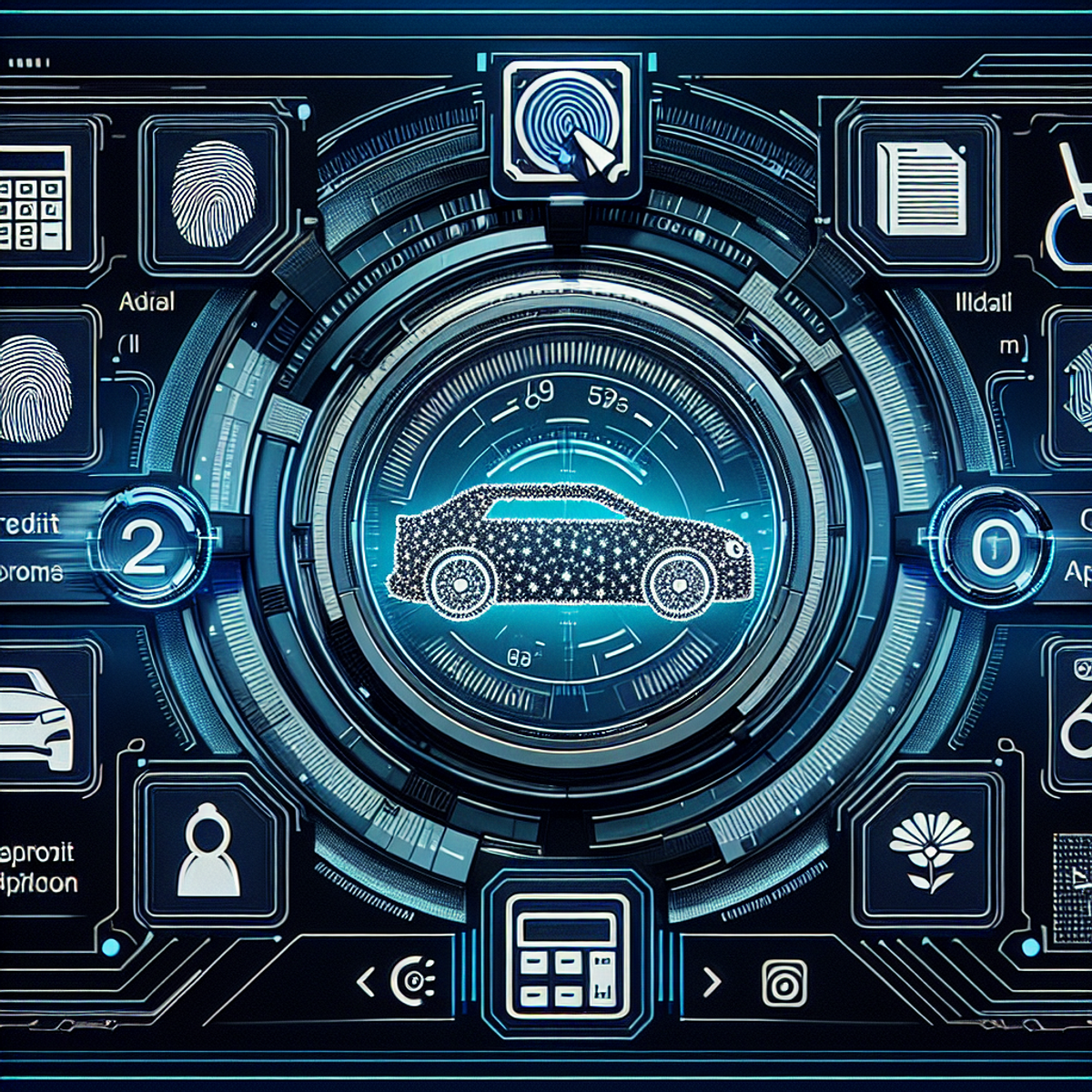Introduction
Blockchain technology has been making waves across various industries, and the automotive sector is no exception. This transformative technology has the potential to revolutionize car loan transactions, offering a myriad of benefits that can significantly impact the auto financing landscape.
The relevance of blockchain technology to the automotive industry lies in its ability to streamline and optimize procedures involved in car loan transactions. By leveraging decentralized networks and distributed ledgers, blockchain technology introduces a new paradigm for conducting secure and transparent transactions.
The impact of blockchain on car loan transactions goes beyond mere digitization; it represents a fundamental shift in the way financing processes are executed. From automated document verification to reshaping global financial transactions, blockchain stands to reshape the entire ecosystem of car loan transactions.
In this article, we will explore the basics of blockchain technology and how it can be specifically applied to auto financing. We will uncover the potential benefits it brings and understand why it is considered a game-changer in transforming traditional practices into efficient, secure, and cost-effective solutions.
Understanding the Fundamentals of Blockchain Technology
Blockchain technology is revolutionizing various industries, including the automotive sector. To comprehend how it’s reshaping car loan transactions, it’s essential to grasp the basics of blockchain technology. In this section, we’ll delve into how blockchain works, highlighting its decentralized nature and the role of cryptography in maintaining data security and integrity.
Decentralized Ledger: The Backbone of Blockchain
At its core, blockchain is a decentralized ledger that records and verifies transactions across multiple computers. Unlike traditional centralized systems where a single authority controls the ledger, blockchain operates on a distributed network. This decentralization brings numerous advantages, such as enhanced transparency, improved security, and increased trust among participants.
In a blockchain network:
- Each participant has a copy of the ledger, known as a node.
- When a new transaction occurs, it gets sent to all nodes in the network.
- Nodes use consensus mechanisms like proof-of-work or proof-of-stake to validate and agree on whether the transaction is legitimate.
- If approved, the transaction gets added to a block.
Once a block is created, it gets linked with previous blocks using cryptographic hashes, forming an unchangeable chain of transactions. This structure ensures that any attempts to modify or tamper with data are immediately detected by other nodes in the network. As a result, blockchain provides an irreversible record of all transactions, promoting accountability and reducing fraud.
Cryptography: Safeguarding Data Integrity
Cryptography plays a vital role in ensuring the security and integrity of data stored on the blockchain. It involves using mathematical algorithms and cryptographic keys to encrypt information, making it unreadable to unauthorized individuals. Let’s explore two fundamental cryptographic techniques used in blockchain:
- Hash Functions: Hash functions are one-way mathematical algorithms that convert an input (transaction data) into a fixed-length string of characters called a hash. These hashes uniquely represent the input data and have several important properties: they are deterministic (the same input always produces the same output), quick to compute, and practically impossible to reverse-engineer. Any slight change in the input data will produce a completely different hash, making it easy to detect any tampering attempts on the blockchain.
- Digital Signatures: Digital signatures provide a means of verifying the authenticity and integrity of data on the blockchain. They involve a combination of public and private cryptographic keys. When a transaction is created, the sender uses their private key to generate a digital signature, which is appended to the transaction. Recipients can then use the sender’s public key to verify that the signature matches the transaction’s contents, ensuring that the data has not been altered during transmission.
By utilizing these cryptographic techniques, blockchain technology ensures that car loan transactions recorded on the ledger remain secure, transparent, and tamper-proof. This level of trust and immutability helps streamline processes, improve efficiency, and build confidence among all stakeholders involved in car loan transactions.
Benefits of Implementing Blockchain in Car Loan Transactions
Blockchain technology has the potential to revolutionize car loan transactions by streamlining processes and enhancing efficiency. Here are some key benefits of implementing blockchain in auto financing procedures:
Streamlining Auto Financing Procedures
Blockchain technology can streamline the complex processes involved in car loans, offering several advantages:
- Efficiency: By leveraging smart contracts and decentralized ledger technology, blockchain can automate and optimize various stages of the car loan process, including application submission, credit checks, and approval processes. This automation reduces the need for manual intervention, leading to faster processing times and improved efficiency.
- Transparency: The decentralized nature of blockchain ensures that all authorized parties involved in the car loan transaction have real-time access to a single source of truth. This transparency can enhance trust among stakeholders and reduce the likelihood of disputes or discrepancies in the loan process.
- Cost Reduction: Implementing blockchain technology in car loan transactions can significantly reduce operational costs associated with traditional paper-based processes, manual document verification, and reconciliation efforts. By eliminating intermediaries and automating tasks, blockchain helps minimize overhead expenses.
Automated Document Verification and Validation
One of the notable benefits of blockchain in car loan transactions is its ability to automate document verification and validation:
- Enhanced Security: Blockchain’s use of cryptographic algorithms ensures that sensitive borrower information, financial documents, and transaction records are securely stored and tamper-proof. This reduces the risk of data manipulation or fraudulent activities, thereby enhancing overall security.
- Immutable Records: The distributed ledger on the blockchain maintains an immutable record of all transaction-related documents and events. This feature provides auditable proof of authenticity and integrity for crucial loan-related documentation throughout the entire lifecycle of the loan.
In essence, implementing blockchain technology in car loan transactions offers a range of benefits, including improved efficiency, transparency, cost reduction, enhanced security, and automated document management. These advantages have the potential to reshape the auto financing landscape by streamlining procedures and optimizing the overall customer experience.
Reshaping Global Financial Transactions
Blockchain has the potential to reshape global financial transactions, especially when it comes to car loan transactions. This opens up a wide range of benefits and opportunities. Let’s take a look at how blockchain technology can improve automotive financing:
1. Elimination of Intermediaries and Enhanced Transparency
- Blockchain technology enables direct peer-to-peer transactions, eliminating the need for intermediaries such as banks or financial institutions.
- This streamlined approach not only reduces associated costs but also enhances transparency within the transaction process.
2. Improved Efficiency and Speedy Approvals
- With blockchain, the verification and approval processes for car loan transactions can be significantly accelerated.
- Smart contracts, powered by blockchain, can automate various stages of the loan approval process, leading to faster decisions and disbursements.
3. Global Financial Transactions and Cross-Border Payments
- One of the most compelling aspects of blockchain technology is its ability to facilitate cross-border payments and international transactions with ease.
- By leveraging blockchain for car loan transactions, borrowers and lenders can engage in seamless global financial activities without being encumbered by traditional banking limitations.
In addition to these benefits, blockchain’s decentralized nature ensures that data is securely stored across a distributed network of computers. This not only reduces the risk of fraud or data manipulation but also enhances the overall security of financial transactions.
By using blockchain technology, the automotive industry has the potential to completely change its approach to global financial transactions related to car loans. The removal of geographical barriers and traditional limitations allows for a more efficient, cost-effective, and transparent system that benefits both lenders and borrowers.
Transforming Tasks Dependent on Intermediaries or Reliable Data Records
Blockchain technology has the potential to revolutionize tasks that currently rely on intermediaries or reliable data records in car loan transactions. By eliminating the need for intermediaries and enhancing transparency, blockchain can significantly improve the efficiency and accuracy of these processes. Here are some key points to consider:
Understanding the role of intermediaries
In traditional car loan transactions, intermediaries such as banks, credit bureaus, and insurance companies play a crucial role in verifying information, conducting background checks, and ensuring compliance with regulations. However, this reliance on intermediaries often leads to delays, higher costs, and increased risk of fraud or errors.
Elimination of intermediaries and enhanced transparency
Blockchain technology can eliminate the need for intermediaries by providing a decentralized and transparent platform for car loan transactions. Through the use of smart contracts, all relevant information such as borrower details, vehicle history, credit scores, and insurance records can be securely stored on the blockchain. This eliminates the need for multiple parties to verify and validate the same information, reducing duplication of efforts and improving overall efficiency.
Improved efficiency and speedy approvals
Car loan applications often involve time-consuming processes such as manual document verification and credit checks. With blockchain technology, these processes can be automated and streamlined. For instance, instead of manually collecting and verifying documents like proof of income or vehicle ownership, authorized parties can directly upload these documents onto the blockchain. This reduces processing time and enables faster approvals.
Enhanced data accuracy
Traditional car loan transactions rely on centralized databases maintained by different entities involved in the process. This creates a risk of discrepancies and errors due to data manipulation or outdated records. In contrast, blockchain provides a decentralized ledger where all transactions are recorded in a transparent and immutable manner. This ensures that all parties have access to the same accurate and up-to-date information, reducing the chances of errors or disputes.
Potential impact on the audit and assurance profession
The adoption of blockchain technology in car loan transactions also has implications for the audit and assurance profession. As highlighted in this report, blockchain can enhance trust, integrity, and security in financial transactions. By providing an immutable record of transactions, auditors can rely on blockchain to verify and validate financial information more efficiently, reducing the need for extensive manual audits.
By leveraging blockchain technology in car loan transactions, the industry can benefit from:
- Improved efficiency
- Reduced costs
- Increased transparency
- Enhanced security
It streamlines processes by eliminating intermediaries and automating verification procedures. Furthermore, it improves data accuracy and reduces the risk of fraud or errors. With blockchain, car loan transactions can become faster, more reliable, and less prone to delays or complications.
Addressing Challenges and Considerations in the Regulatory Landscape
The adoption of blockchain technology in car loan transactions brings about numerous advantages, but it also presents challenges and considerations in the regulatory landscape. As this innovative technology disrupts traditional financial systems, it is essential to address these issues to ensure its responsible and effective implementation.
Overview of the Current Regulatory Challenges and Efforts
Regulating blockchain transactions poses several challenges due to its decentralized nature and the lack of a central authority governing the network. Here are some key considerations:
- Uncertainty: Blockchain technology is still relatively new, and regulators are grappling with understanding its intricacies and potential implications fully. The rapidly evolving nature of this technology makes it challenging to establish comprehensive regulations.
- Privacy and Data Protection: Blockchain’s inherent transparency raises concerns regarding the privacy of personal information stored on the distributed ledger. Striking a balance between transparency and protecting sensitive data is crucial for successful implementation.
- Legal Compliance: Existing legal frameworks may not adequately address blockchain-based transactions, requiring regulators to update regulations or develop new ones altogether. These include issues such as contract enforceability, dispute resolution, and consumer protection.
Efforts are underway to tackle these challenges and create a regulatory framework that fosters blockchain adoption while safeguarding consumer interests.
Ensuring Privacy and Data Protection
Maintaining privacy and data protection is crucial when implementing blockchain technology in car loan transactions. Here’s how privacy concerns can be addressed:
- Pseudonymity: While blockchain transactions are transparent, participants can use pseudonyms instead of revealing their real identities. This provides a certain level of privacy while maintaining traceability.
- Permissioned Blockchains: Implementing permissioned blockchains can limit access to sensitive information only to authorized participants, thus safeguarding personal data.
- Data Encryption: Employing encryption techniques can ensure that confidential information remains secure while still benefiting from the transparent aspects of blockchain technology.
Addressing Legal and Compliance Issues
The adoption of blockchain technology in car loan transactions requires overcoming legal and compliance challenges. Consider the following strategies:
- Collaboration with Regulators: Engaging in open dialogues with regulatory bodies can help foster a better understanding of blockchain technology and enable the development of appropriate regulations.
- Smart Contracts: Smart contracts, self-executing agreements on the blockchain, can facilitate compliance by automating certain aspects of transactions and ensuring adherence to predefined rules and regulations.
- Interoperability with Existing Systems: Integrating blockchain with existing financial systems can enhance compatibility and ease the transition while maintaining compliance with current regulations.
By addressing these challenges and considerations, the regulatory landscape can be adapted to accommodate blockchain technology effectively. This will foster innovation, while also ensuring consumer protection and maintaining trust in the financial system.
The Future of Car Loan Transactions: A Blockchain-Powered Ecosystem
As blockchain technology continues to evolve, its potential to transform car loan transactions is becoming increasingly evident. Here are some key points to consider when looking at the future of blockchain-powered car loan transactions:
1. Exploration of Potential Future Developments and Advancements in the Application of Blockchain in Automotive Financing
- Smart contracts: Blockchain technology enables the use of smart contracts, which are self-executing contracts with predefined terms and conditions. In the context of car loan transactions, smart contracts can automate the process of loan approval, disbursement, and repayment, reducing paperwork and minimizing human error.
- Tokenization of assets: Blockchain has the ability to tokenize physical assets like cars, allowing for fractional ownership and enabling new financing models. This could lead to innovative ways of securing loans and sharing ownership in a transparent and secure manner.
- Integration with Internet of Things (IoT): Connecting blockchain technology with IoT devices in cars can provide real-time data on vehicle usage, maintenance history, and driving behavior. This information can be used by lenders to assess risk more accurately and offer personalized loan terms.
2. Importance of Collaboration between Industry Stakeholders
- Collaboration between automotive manufacturers, financial institutions, regulators, and technology providers is crucial for the widespread adoption and implementation of blockchain technology in car loan transactions. By working together, these stakeholders can establish standards, address interoperability challenges, and ensure compliance with regulatory requirements.
- Industry consortia such as MOBI (Mobility Open Blockchain Initiative) are already bringing together major players in the automotive industry to explore the potential benefits of blockchain technology. Through collaboration and knowledge sharing, they aim to accelerate the development and deployment of blockchain solutions in various areas including finance.
The future of car loan transactions lies in a blockchain-powered ecosystem that offers increased efficiency, transparency, security, and cost savings. By embracing this technology and fostering collaboration among industry stakeholders, we can expect to see significant advancements in the way car loans are processed, managed, and secured. According to a recent study published on Springer, these advancements could reshape the entire landscape of automotive financing as we know it.
Conclusion
It’s important to stay updated on the latest trends and innovations in blockchain technology for car loan transactions. Blockchain technology is always changing, and knowing how it’s being used in the auto finance industry can be really helpful for professionals and consumers alike. As blockchain keeps changing how car loans work, it’s crucial to know about new things happening and partnerships between companies to understand just how powerful this technology can be.
By staying up-to-date with the latest happenings in blockchain technology, you can better understand how it’s making car loan transactions faster, safer, and more efficient. It’s also a good idea to know about any new rules or projects in the industry so you can see the bigger picture of what’s going on.
Using blockchain technology for car loans means we have to always keep learning and changing. No matter if you work in finance, love tech stuff, or just want to know about car financing, keeping an eye on how blockchain is growing will help you make better choices and find new opportunities in this fast-paced world.
As you learn more about how blockchain can change car loans, remember that knowledge is power when it comes to using it well. Stay curious, stay informed, and stay ahead with blockchain-powered auto financing.
Keep learning, keep adapting, and keep innovating with blockchain technology in car loan transactions.


